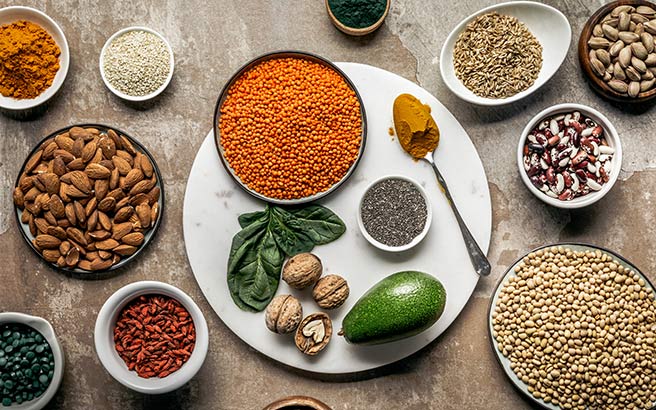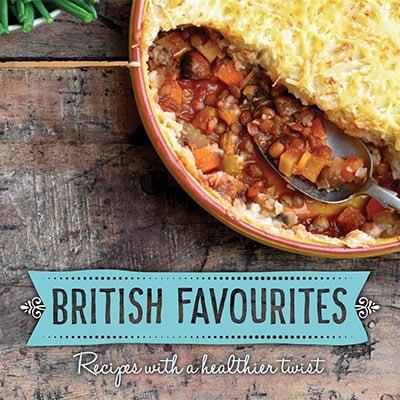 Researchers at the American Gut Project found that people who ate more than 30 different plant foods each week had a more diverse gut microbiome compared with those who ate 10 or fewer.
Researchers at the American Gut Project found that people who ate more than 30 different plant foods each week had a more diverse gut microbiome compared with those who ate 10 or fewer.
The research also showed that people who hit the 30 mark had more bacteria that produce something called short chain fatty acids. And these fatty acids have been shown to reduce your risk of bowel cancer.
What are our Cancer Prevention Recommendations?
At World Cancer Research Fund, we have strong evidence that plant-based foods decrease the risk of other cancers. And one of our Cancer Prevention Recommendations is to enjoy more grains, vegetables, fruit and beans, ideally eating at least 5 portions of fruit and veg a day.
Although eating 30 plant-based foods a week isn’t one of our recommendations, we were intrigued to find out just how difficult is it to eat 30 different plant foods in a week? So, I tried it out for a month to see…
What counts as a plant food?
This was the first thing to get my head round. 5 A DAY is pretty straightforward – we all understand fruit and vegetables – but this is a slightly different proposition.
- Fruit and vegetables are obviously plant foods: each variety can count as one – so a cos lettuce is different to watercress, rocket and iceberg. As with 5 A DAY, sweet potatoes are good, and – unlike 5 A DAY – the good old-fashioned King Edward potato does count.
- Legumes: so we’re talking beans, such as black, cannellini or kidney, chickpeas, and lentils.
- Grains: oats, buckwheat, millet, wheat, brown rice, wholemeal pasta and quinoa. White pasta and rice aren’t included, because the industrial processes used to remove the wholegrains strip them of many of their nutritional benefits.
- Nuts and seeds: almonds, hazelnuts, sunflower seeds, pumpkin seeds, cashews – so many to choose from.
- Herbs and spices: Obviously they’re plant-based but, because the quantities we eat tend to be fairly small, each is only counted as one-quarter.
> The surprising nutritional benefits of nuts
Now I understood which foods were eligible under the American Gut Project study. Where this challenge differs from the 5 A DAY recommendations is that each item only counts once in the week. As soon as you eat that apple on a Monday, you can’t count it again till the 7 days are up.
I tracked my food using a simple spreadsheet – writing each new food down per day and then adding each day’s total up, keeping a running total over each 7-day period.

> Your gut microbiome and how to keep it happy
What was I expecting?
I think I have a fairly healthy diet. I may be prone to the odd packet of crisps or bar of chocolate, but it’s a rare day when I don’t eat more than five portions of fruit and veg.
Although I eat meat, it’s usually restricted to an evening meal, and even then, not every day. Plus, we don’t tend to eat white carbs very much at home either, so I figured I’d hit the 30 a week quite easily.
Plant-based diet for beginners
The first thing to note is that during the first couple of days of the week, you really rack up the variety, but it can quickly tail off over the following days.
In my first week, by Wednesday, I’d already eaten 18 different foods, ranging from banana and blueberries, through kale and olives, to tinned pears and wholemeal bread.
But that’s when it started to get difficult. I usually batch cook my weekday lunches to make life easy, which means I’m less likely to buy something unhealthy. But for this challenge that’s not necessarily a plus, because it means I don’t get much variety for that meal across 7 days.
On Thursday week 1, I only added two new foods – tenderstem broccoli and brown rice – and I realised I was going to struggle to hit 30. So I sort of cheated. The next day I bought a veg-packed slaw pot to supplement my lunch, which gave me 6.5 (two herbs made up the half) new food types for the week.
That helped me get over the line, meaning in week 1 I ate 30.5 different plant foods. I did it!
It also inspired me to continue the experiment for a further full month, just to see if that week was a one-off, and also not think too hard about my meals and what I was eating.
And by the end of the month, I discovered that I do eat 30 different plant-based foods a week regularly.
> Tomato shortage: how to eat healthily through the vegetable crisis
How did the challenge change my eating habits?
Even as someone who eats pretty healthily, it made me consider the variety of my diet. It definitely focused my mind on avoiding crisps and chocolate, and supplementing them with fruit or vegetables where possible.
It wasn’t a hard sell to ensure my mid-morning snack was carrot sticks, instead of salt & vinegar chipsticks.
Similarly, eating fruit and yoghurt after dinner, instead of something more processed and calorie-laden, was a nice way to end the day.
A spicier life
It’s undeniable that eating a varied diet is good for you. Quite aside from the health benefits of all those different vitamins, minerals, flavonoids and antioxidants, the enjoyment of trying different things regularly avoids mealtimes getting stale.
What I was conscious of, though, was the expense of eating so many different varieties of food. The cost of buying all that fruit and veg mounts up quickly.
One solution – in the long term – is buying frozen to make food last longer, or using tinned products. You could also check out food sharing services in your area.
Sometimes it also comes down to finding a bit of inspiration, and our recipes site can really help. We have more than 300 recipes, many of which use a variety of plant-based foods – including ones you may be less sure about how to cook, such as chickpeas, cabbages and fennel.
Where next?
> Try one of our healthy vegetarian recipes
> Why you should be eating more pulses
> What fruit and veg could you try? Check out our A-Z
This blog was updated on 11 May 2023 to emphasise that eating 30 plant-based foods a week is not one of of World Cancer Research Fund’s Cancer Prevention Recommendations.
#mc_embed_signup{background:#fff; clear:left; font:14px Helvetica,Arial,sans-serif; width:600px;}
/* Add your own Mailchimp form style overrides in your site stylesheet or in this style block.
We recommend moving this block and the preceding CSS link to the HEAD of your HTML file. */
#mc-embedded-subscribe-form input[type=checkbox]{display: inline; width: auto;margin-right: 10px;}
#mergeRow-gdpr {margin-top: 20px;}
#mergeRow-gdpr fieldset label {font-weight: normal;}
#mc-embedded-subscribe-form .mc_fieldset{border:none;min-height: 0px;padding-bottom:0px;}
Sign up to our monthly email
* indicates required
How we can contact you
We’d love to keep in touch with you about the work we do at World Cancer Research Fund, and how you can help and support, so please tell us how you’d like to hear from us:
You can unsubscribe at any time by clicking the link in the footer of our emails.
We use Mailchimp as our marketing platform. By clicking below to subscribe, you acknowledge that your information will be transferred to Mailchimp for processing. Learn more about Mailchimp’s privacy practices here.
(function($) {window.fnames = new Array(); window.ftypes = new Array();fnames[0]=’EMAIL’;ftypes[0]=’email’;fnames[1]=’FNAME’;ftypes[1]=’text’;fnames[2]=’LNAME’;ftypes[2]=’text’;fnames[3]=’ADDRESS’;ftypes[3]=’address’;fnames[4]=’PHONE’;ftypes[4]=’phone’;fnames[5]=’MMERGE5′;ftypes[5]=’text’;fnames[6]=’MMERGE6′;ftypes[6]=’text’;fnames[7]=’MMERGE7′;ftypes[7]=’text’;fnames[8]=’MMERGE8′;ftypes[8]=’text’;fnames[9]=’MMERGE9′;ftypes[9]=’text’;fnames[10]=’MMERGE10′;ftypes[10]=’text’;fnames[11]=’MMERGE11′;ftypes[11]=’text’;fnames[15]=’MMERGE15′;ftypes[15]=’text’;fnames[16]=’MMERGE16′;ftypes[16]=’text’;fnames[19]=’MMERGE19′;ftypes[19]=’text’;fnames[20]=’MMERGE20′;ftypes[20]=’date’;fnames[21]=’MMERGE21′;ftypes[21]=’text’;fnames[22]=’MMERGE22′;ftypes[22]=’text’;fnames[23]=’MMERGE23′;ftypes[23]=’text’;fnames[24]=’MMERGE24′;ftypes[24]=’text’;fnames[25]=’MMERGE25′;ftypes[25]=’text’;fnames[26]=’MMERGE26′;ftypes[26]=’text’;fnames[27]=’MMERGE27′;ftypes[27]=’text’;fnames[28]=’MMERGE28′;ftypes[28]=’text’;fnames[29]=’MMERGE29′;ftypes[29]=’text’;fnames[30]=’MMERGE30′;ftypes[30]=’text’;fnames[12]=’MMERGE12′;ftypes[12]=’text’;fnames[13]=’SIGNUP’;ftypes[13]=’text’;}(jQuery));var $mcj = jQuery.noConflict(true);



